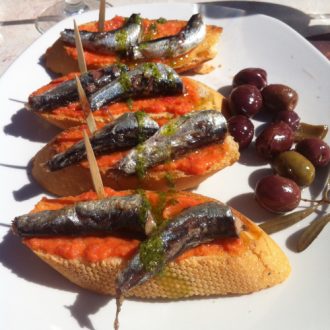
Can I Survive as a Celiac in Spain
Dear Ana,
 Finding out you were a celiac was probably one of the most relieving-yet-frustrating experiences you ever had. On one hand, you finally knew what was wrong with you. On the other, you probably could imagine how hard it was going to be to maintain a gluten-free diet. Going abroad can be difficult even when you don’t have a dietary restriction such as being a celiac (or a vegetarian/vegan), but if you are wondering if you will be able to survive gluten-free in Spain for a study abroad program—or a life abroad—our answer is yes!
Finding out you were a celiac was probably one of the most relieving-yet-frustrating experiences you ever had. On one hand, you finally knew what was wrong with you. On the other, you probably could imagine how hard it was going to be to maintain a gluten-free diet. Going abroad can be difficult even when you don’t have a dietary restriction such as being a celiac (or a vegetarian/vegan), but if you are wondering if you will be able to survive gluten-free in Spain for a study abroad program—or a life abroad—our answer is yes!
Although we are not gluten-free, we do have friends in Spain who are, and they seem to do just fine. These are our top tips if you are planning on coming to visit or stick around long-term as a celiac in Spain:
1.) Take advantage of ‘normal’ Spanish food that is gluten free:
We understand that this is difficult for people who are celiac or have other allergies as you have to be careful with the preparation of food as well as the ingredients in the dish. At the same time, there are many delicious Spanish foods that you can thoroughly enjoy such as: Spanish omelette, papas a lo pobre (literally, poor people’s potatoes), roasted meats and fish, big salads, etc.
At the same time, make sure to keep in mind that many embutidos, or Spanish styled dried meats, and dips may contain wheat ingredients that could lead to gluten production. We recommend reading all labels or clearly asking your server before moving forward with a choice. While this is something that you will find all over the world, knowing the word and how to pronounce ‘wheat’ (trigo), ‘gluten’ (gluten), and ‘celiac’ (celíaco/a) in Spanish is good practice.
2.) Check out grocery stores for amazing options:
If you don’t want to risk eating out, feel assured that grocery stores are continuously providing more options for different diets. As a gluten-free eater, we would highly recommend checking out Mercadona they have made a big push towards offering products that satisfy the needs of celiacs! In addition, they are constantly introducing new products made specifically for this demographic under their own store brand.
You should also know that there are ‘health food’ stores that are popping-up more and more which offer gluten-free alternatives as well. These stores are great for finding things like high quality gluten-free bread, cookies, and other goods you might not find in a regular supermarket. However, you should also know that they might be more expensive (as they tend to be organic as well), but they are always a good option if your budget allows you to shop there or if you are in a pinch.
Pro-tip: Check out our easy Spanish for supermarkets here.
3.) Look for specialty places:
Our gluten-free friends are constantly telling us about new places in their cities where they can eat food that is carefully prepared just for a celiac diet. These places will cater to people who have issues like you and it is nice to feel safe in your restaurant. Obviously, these types of places are more common in big cities like Barcelona and Madrid, but we even have a few in Granada now. Local forums and bloggers will help you find places that are new or fun to try.
 However, please be careful as Claudia was once was at a place that catered to celiacs and, while the owners knew what they were doing, the waiters weren’t fully on top of the situation. This lead to a celiac friend ending up in an uncomfortable (literally) situation as she was given normal bread because the gluten free bread hadn’t ‘arrived yet.’ So, make sure you check with the staff to make sure they understand that you are celiac and what that means.
However, please be careful as Claudia was once was at a place that catered to celiacs and, while the owners knew what they were doing, the waiters weren’t fully on top of the situation. This lead to a celiac friend ending up in an uncomfortable (literally) situation as she was given normal bread because the gluten free bread hadn’t ‘arrived yet.’ So, make sure you check with the staff to make sure they understand that you are celiac and what that means.
What tips and tricks have you learned as a celiac abroad? Do you have any specific restaurants that you have been to in Spain that you would recommend?
Sincerely,
Spain





6 Comments
andreebourgeois@gmail.com
My wife is a celiac and has several other food allergies. She spent a summer at the University of Granada in 2016 and found it was easier to eat out in restaurants and find gluten-free options in Spain than here in the US. Obviously communicating your needs is challenging if you don’t speak Spanish. But once servers understood, they were very accommodating and took things very seriously. Also because food in Spain tends to have fewer additives and is more often prepared fresh, it’s easier to understand the exact ingredients in a dish. We are looking forward to retiring in Granada for a laundry list of reasons, and the ease of finding allergy-safe food is certainly not the least of them.
Sincerely, Spain
Thank you so much for this comment Andrée! We knew the options for celiacs has been improving over the years in Spain but we didn’t realize that the situation was better than in other places like the U.S. And we didn’t even consider the fact that food here is so fresh (and without additives)—we are so used to it that we often forget that it is not the same everywhere! It is wonderful to know you will be retiring to Granada! Best of luck with everything and if you have any questions, please reach out!
Mikel
The rumor about the owner of Mercadona’s daughter being a celiac is an urban legend that he has addressed before. I don’t know why people insist on spreading this fake story. He himself called it a simple business decision.
Rachel Myers
Hello, my husband and I will be spending a few weeks in spain this August. I have celiac and we are renting an airbnb so we can cook most of our food, but we will try a few of the gluten free restaurants. I was wondering if you could please tell me about the process for buying meat in spain? In the US I don’t normally get our meat from the butcher counter because they use a lot of bread crumbs and seasonings that may may have gluten in that area. We try to stick to buying plain non-seasoned meat that came already packaged to the store. Do you know if that is an option in spain or is the butcher counter the only place to get meat from?
Sincerely, Spain
Dear Rachel,
Lovely to hear you will be spending some time in Spain! We hope you and your husband are able to truly enjoy it. In most supermarkets, especially the larger ones, you will be able to find a variety of ingredients and potentially even prepared food without gluten. In stores like Mercadona, you will be able to find gluten free items around the store. In large stores like Carrefour (usually located outside city centers), you will usually find whole sections dedicated to gluten free items. No matter where you are looking, however, the items will likely be clearly labeled “gluten free” or “sin gluten”. Luckily, this word translates! The same goes for meat products—although we haven’t bought meat specifically looking for gluten free meat, there are packaged meat with this label. We are not sure how many different options you will be able to find, but hopefully it will be sufficient for the trip. Finally, if you are planning to eat out, we highly recommend researching the places you plan to eat before you go and confirming with the wait staff before you order. Depending on how severe your celiac is, you should confirm the capacity of the kitchen before taking any risks.
Please feel free to reach out otherwise if you have additional questions and enjoy your time in Spain!
Sincerely,
Spain